|
|
|
Sort Order |
|
|
|
Items / Page
|
|
|
|
|
|
|
| Srl | Item |
| 1 |
ID:
118987
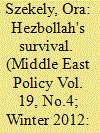

|
|
|
| 2 |
ID:
144710


|
|
|
|
|
| Summary/Abstract |
This article analyses the political relationship between Ethiopia and Egypt. It aims to provide an analytical framework to unpack this complex relationship and assess the impacts that the Nile River has on the nature of this relationship. It further identifies geopolitical factors determining the impacts of the Nile River on frameworks of actions and political opportunity structures in which political actors operate. Accordingly, the different combinations of these determinants lead to the formation of political actors and ensuing actions that can fuel conflict, sustain the status quo or build peace. The article seeks to provide tentative answers to the following questions: what can be done or what mechanisms might be used to reduce the risk of conflict? What parties should participate and what will be their roles? And how can modern technology and science contribute to a possible solution?
|
|
|
|
|
|
|
|
|
|
|
|
|
|
|
|
| 3 |
ID:
143899
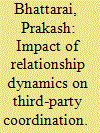

|
|
|
|
|
| Summary/Abstract |
A growing field within mediation research explores issues of third-party coordination. The existing literature highlights third-party coordination as a problematic but extremely important conflict intervention strategy, but lacks an in-depth explanation of fundamental aspects of third-party coordination. Considering this research gap, this study explores a fundamental theme related to third-party coordination: the influence of third-party relationship dynamics. This theme is elaborated by means of an analysis of two case studies: the Maoist armed conflict of Nepal and the Moro conflict of the Philippines. My research finds that power differences among third parties, their attitudes towards each other, differences in intervention strategies and priorities, the nature of conflicts, and the actions taken by the conflicting parties are key contextual factors that influence the dynamics of third-party relationships. Successful coordination is more likely when there is interdependence and a sense of respect between third parties.
|
|
|
|
|
|
|
|
|
|
|
|
|
|
|
|
| 4 |
ID:
098447
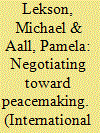

|
|
|
|
|
| Publication |
2010.
|
| Summary/Abstract |
This article outlines the approach of the United States Institute of Peace (USIP) to training in negotiation and associated skills. USIP has provided such training for over a decade to a wide array of international practitioners, both those who are in some way directly engaged in, or at least affected by, a conflict, and international third parties from outside the conflict zone. USIP concentrates in its negotiation training on building an understanding of the negotiating environment as well as on building specific negotiation strategies. In addition to skill-building, the training programs focus on developing an understanding of the nature and dynamics of conflict and of the overlapping and interlocking nature of actors, issues, and interests in a conflict situation. The article points out five elements of content that must be included to ensure a successful program, providing illustrative examples from actual workshops. These elements include helping participants to establish effective relationships with negotiating counterparts; presenting basic concepts; acquiring and improving skills; practicing through simulations; and working together on how best to apply these skills to the real world conflicts with which they are dealing. The two case studies describe training programs for Serbian and Albanian leaders in Kosovo, and for Iraqi civil servants.
|
|
|
|
|
|
|
|
|
|
|
|
|
|
|
|
| 5 |
ID:
111475
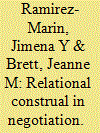

|
|
|
|
|
| Publication |
2011.
|
| Summary/Abstract |
In certain cultures, relationships are the reason for negotiation. In this article, we offer a rationale regarding why relationships have more or less salience across cultures. We present psychological, economic and sociological factors that explain the reasons for negotiating relationally. Propositions are made as to how cultural construal about relationships influences offers, targets and limits, negotiation strategy and, ultimately, economic and relational outcomes. Our major explanatory construct is new: cultural consensus about relationships. This construct is grounded in well developed theory of self construal and new empirical research showing the utility of measures of consensus in explaining cultural differences in behavior. With this theoretical contribution, we join the group of scholars who are advocating that more attention should be paid to negotiators' subjective evaluations of the social and emotional consequences of negotiation.
|
|
|
|
|
|
|
|
|
|
|
|
|
|
|
|
| 6 |
ID:
088161
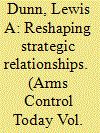

|
|
|
|
|
| Publication |
2009.
|
| Summary/Abstract |
Soon after the Obama administration took office, Vice President Joe Biden set the tone of the new administration's approach toward Moscow when he called for the United States and Russia to press the "reset button" in their bilateral relationship.[1] This theme was reiterated in the March 9, 2009, meeting between Secretary of State Hillary Rodham Clinton and Russian Foreign Minister Sergey Lavrov. Providing guidance to their bureaucracies, Presidents Barack Obama and Dmitry Medvedev, at their meeting on the margins of the April G-20 financial summit in London, "decided to begin bilateral intergovernmental negotiations to work out a new, comprehensive, legally binding agreement on reducing and limiting strategic offensive arms to replace" START
|
|
|
|
|
|
|
|
|
|
|
|
|
|
|
|
| 7 |
ID:
188793


|
|
|
|
|
| Summary/Abstract |
Military suicide prevention efforts would benefit from population-based research documenting patterns in risk factors among service members who die from suicide. We use latent class analysis to analyze patterns in identified risk factors among the population of 2660 active-duty military service members that the Department of Defense Suicide Event Report (DoDSER) system indicates died by suicide between 2008 and 2017. The largest of five empirically derived latent classes was primarily characterized by the dissolution of an intimate relationship in the past year. Relationship dissolution was common in the other four latent classes, but those classes were also characterized by job, administrative, or legal problems, or mental health factors. Distinct demographic and military-status differences were apparent across the latent classes. Results point to the need to increase awareness among mental health service providers and others that suicide among military service members often involves a constellation of potentially interrelated risk factors.
|
|
|
|
|
|
|
|
|
|
|
|
|
|
|
|
| 8 |
ID:
121001
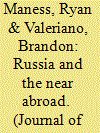

|
|
|
|
|
| Publication |
2012.
|
| Summary/Abstract |
The steps-to-war theory has made important strides in uncovering the causes of interstate armed conflict. Scholars now have a reliable way to delineate the path to war or towards peace. This article explores the relationship between Russia and its 'Near Abroad' neighbors Estonia, Ukraine, and Georgia to investigate the probability of war and conflict in the region during the post-Cold War era. Here, we create a risk barometer for war by combining recent empirical findings with qualitative foreign policy analysis. The analysis demonstrates Estonia's probable successful path out of war with Russia, while the Ukraine's growing risk for coming conflict increases as the variables of interest pile on. Georgia and Russia have already had a war that followed the path outlined in the theory and might battle again in the future based on our findings. This article demonstrates how an empirical theory of international relations behavior can be used to explore the potential for future conflict in the region so as to inform policy analysis.
|
|
|
|
|
|
|
|
|
|
|
|
|
|
|
|
| 9 |
ID:
190683


|
|
|
|
|
| Summary/Abstract |
This article contributes to studies on youth in Turkey by exploring gender, sexuality, intimacy, and relationship practices among college students. Our findings show that there is change (a) towards greater gender equality; (b) about attitudes regarding family, sexuality, and romance; and (c) in understanding and experiencing gendered violence in the groups of students we examined. Progressive values appear to become more common among the participants despite the increasingly conservative tone of the political and cultural climate. However, traditional relationship patterns and norms, including the idealization of monogamous relationships, robust familial ties, and sensitivity for moral reputation, seem prevalent even though these were not associated with the ascendant politico-religious conservatism. By constituting ‘secular but conservative’ intimate selves and relations, our respondents approve the freedom and right to explore possibilities for others, and yet not immediately for themselves, as they preserve an unequivocal moral self.
|
|
|
|
|
|
|
|
|
|
|
|
|
|
|
|
| 10 |
ID:
098444
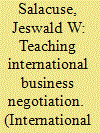

|
|
|
|
|
| Publication |
2010.
|
| Summary/Abstract |
The author has taught international business negotiation in a wide variety of university courses and executive training programs throughout the world during the last three decades. He has taught international business negotiation both as an end in itself and as a means to teach law, an approach that he calls "the law in the shadow of negotiation." This article examines three fundamental dimensions of that experience: pedagogical goals, course content and teaching methods. His principal pedagogical goals in international business negotiation courses have been three-fold: better negotiation analysis, improved negotiation skills, and increased international business knowledge. Depending on the time available, the content of his international business negotiation courses covers three broad areas: the fundamentals of conflict analysis and the negotiation process, basic themes in international negotiation, such as the importance of negotiation, preparation and the management of internal negotiations, and the special obstacles faced in international business negotiation, such as cultural differences among the parties, the actual or potential role of governments in the negotiation process, and challenges to the stability of negotiated agreements. The author's teaching relies heavily on experiential methods and materials, such as exercises, simulations and cases, although more didactic methods also have a role.
|
|
|
|
|
|
|
|
|
|
|
|
|
|
|
|
| 11 |
ID:
087526
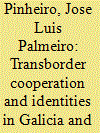

|
|
|
|
|
| Publication |
2009.
|
| Summary/Abstract |
This article deals with the design and effects of state-centred strategies over a specific border area. Nationalist ideologies, culture, identity and persistence of historical facts are considered altogether in the case study of transborder relationships across a part of the Spanish-Portuguese boundary. Special attention is paid to political discourses and claims for recognition of transborder cultural feature and identity. As a matter of fact, the border's opening processes underwent in Europe and in other regional contexts around the world show clearly the permanence of nationalist and state-centred ways of understanding the world. Nationalism is reproduced by institutions and individuals through the consideration of cultural ties and differences across borders. Meanwhile, the globalising context in which we live makes necessary the assertion of multiple territorial and non-territorial identifications capable of overcoming the modern political framework based on states and boundaries.
|
|
|
|
|
|
|
|
|
|
|
|
|
|
|
|
|
|
|
|
|